
Climate Action
Climate change is a crisis staring at the face of humanity, and the urgency of action countering it cannot be overstated. Climate action is thus an integral part of the Sustainable Development Goals adopted by the United Nations in 2015. The warming earth has grave implications on life on our planet, impacting us in manners not readily comprehended- ranging from increased frequency of extreme weather conditions and rising sea levels, to economic impacts such as food scarcity and increased risks of human-human and human-nature conflicts. These far-reaching consequences can be easily recognized by the fact that SDG 13 is invariably synergistic with other SDG goals such as good health, sustainable cities, clean energy, zero hunger and lives on land and water. It is the responsibility of each one of us- as individuals, societies and nations- to be aware of the impending risks, and to implement accelerated measures towards mitigating the damage done.
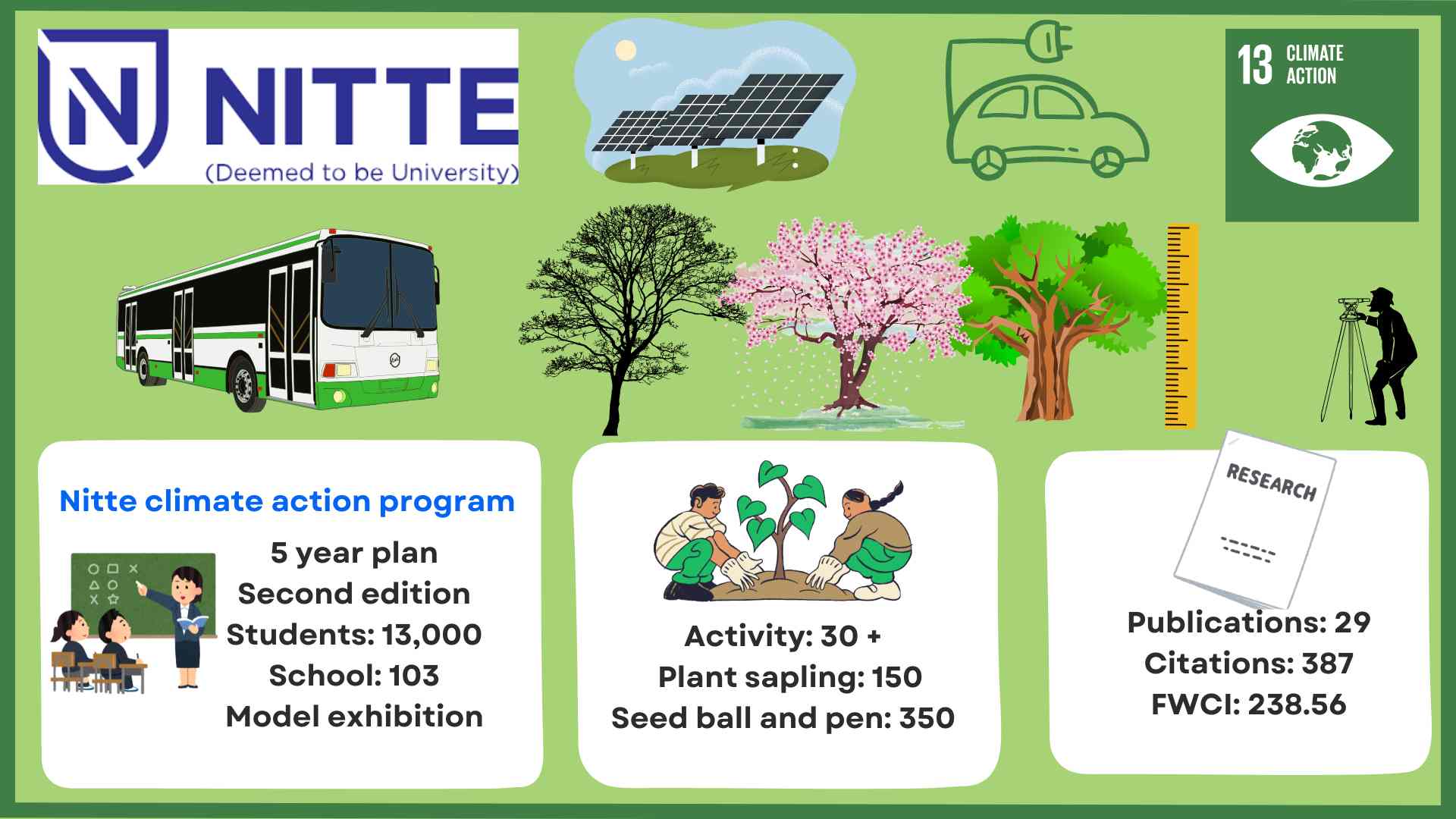
Proactive steps taken by NU:
Nitte Climate Action Program
Nitte (Deemed to be University) had been taking proactive steps over the years to mitigate climate change. In late 2023, the University launched the Nitte Climate Action Program (NCAP) with the intent of addressing climate change among school children. The program was planned for a total duration of five years, and 2024 marked its second year. During NCAP 2024, climate change awareness was created among a total of 13,000 students from 103 schools across the Mangalore North Zone. University resource persons visited the schools, screened short videos, and conducted interactive sessions. The event was organized in collaboration with Mangalore Refinery and Petrochemicals Limited (MRPL) and Karnataka Milk Federation (KMF).
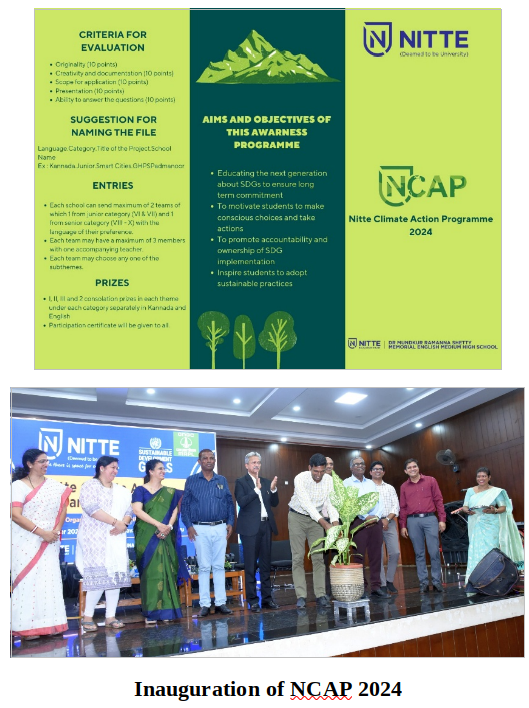
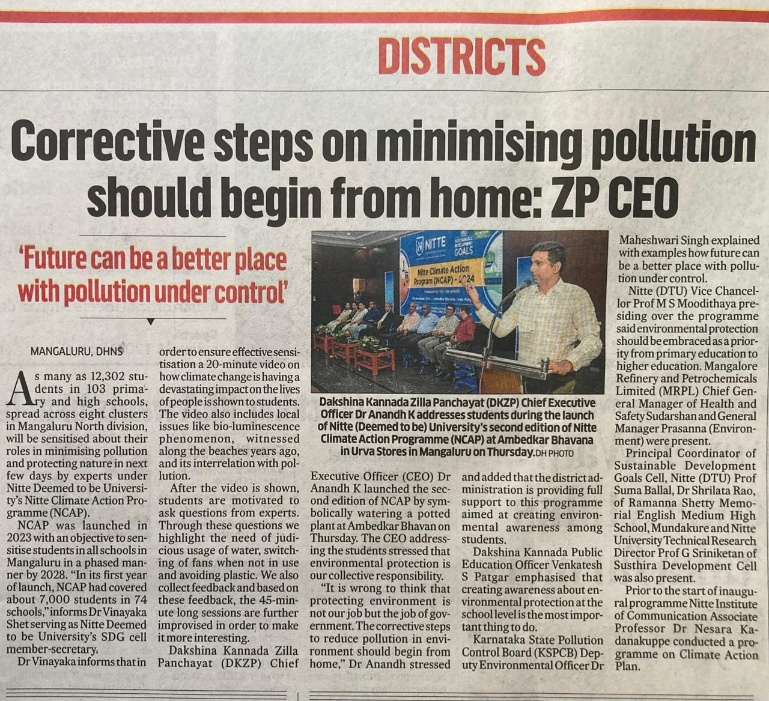
The NCAP video took viewers on an engaging and informative journey, encouraging children to take small but meaningful actions to protect the planet. Through simple narration and relatable visuals, the video explained the concept of sustainable development and showcased everyday eco-friendly practices. It emphasized the importance of saving water and energy, avoiding single-use plastics, using solar power, and adopting rainwater harvesting. Children were shown planting trees, using indoor plants, and taking responsibility for switching off lights and fans at school and home. The video also addressed serious environmental concerns, such as the Pachanadi dumping yard and bioluminescence linked to sea pollution, helping young minds understand real-world consequences. By illustrating how individual actions could reduce waste and pollution, the video inspired a sense of environmental responsibility. It concluded with a motivating message that every small effort counted and encouraged children to become “planet protectors,” working together to build a healthier, greener Earth for future generations.
Model competition on climate change:
Model competition on climate change was organized on 18th December 2024 at Nitte University. School children actively took part in the model competition with innovative ideas.
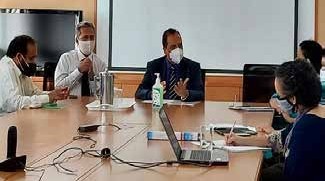
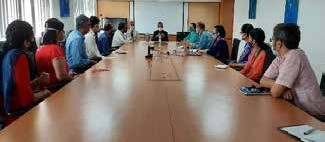
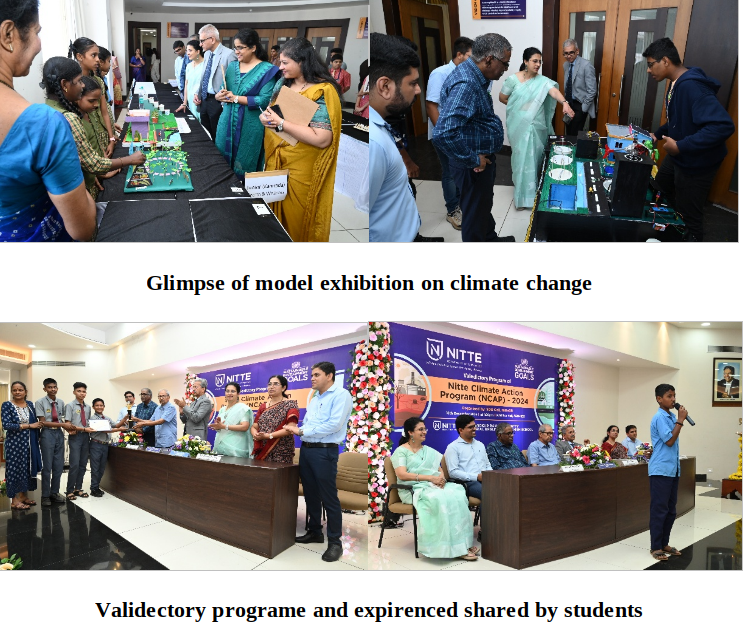
Tree audit
A tree audit was initiated to assess the number of trees, their height, girth, and geographic coordinates (latitude and longitude) across the University campuses. As part of the audit, each tree was geotagged and marked with a unique identification number to accurately map the tree cover and support future afforestation initiatives within the campus.
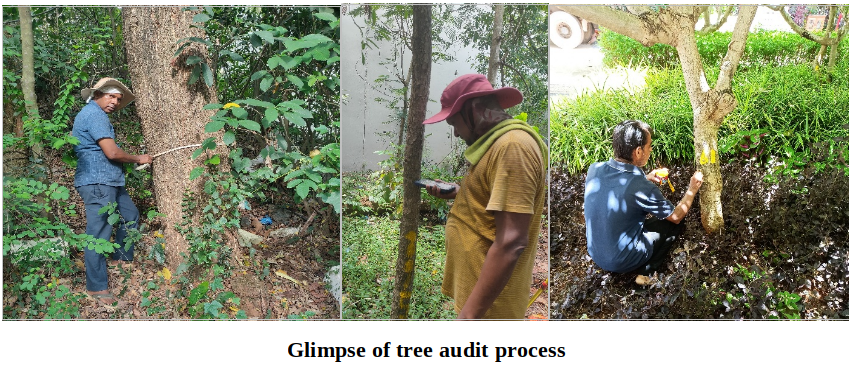
Transition to Clean Energy
The university is committed to reducing its reliance on conventional energy sources and transitioning to clean energy through a phased approach. To support this goal, rooftop solar panels with a total installed capacity of 519.69 kW have been strategically placed across the campus to optimize solar energy generation. In 2024, clean energy sources met 51% of the university’s total energy requirements, marking significant progress toward a sustainable and energy-efficient campus.
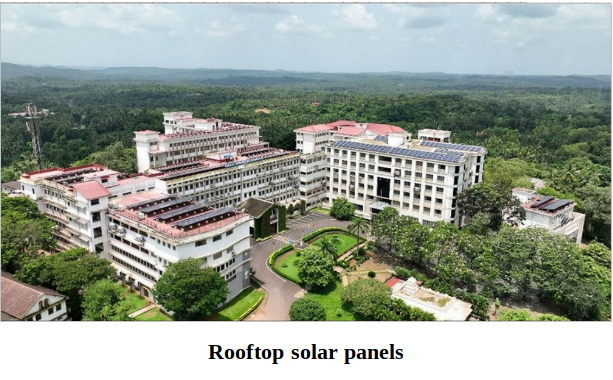
Transport facilities
NITTE (Deemed to be University) actively promotes sustainable transportation as part of its commitment to environmental stewardship. To minimize reliance on private vehicles and reduce carbon emissions, the university provides common transport facilities for staff, students, and other employees. A dedicated fleet of buses serves as the primary mode of transit across all campuses, significantly lowering the institution’s carbon footprint. Additionally, six 14-seater vans operate regular routes between campuses and nearby city areas, ensuring convenient and efficient mobility for the university community. This eco-friendly transport initiative not only helps reduce traffic congestion and greenhouse gas emissions but also fosters a culture of sustainability and environmental responsibility within the campus.
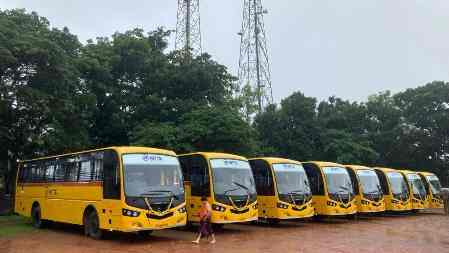
Electric vehicle usage
Electric vehicles are used to facilitate transportation within the university. Staff mobility between campuses is encouraged through the use of electric vehicles provided by the university, promoting sustainable and eco-friendly travel on campus.

Planting Drought Resistant Saplings
A drought-resistant plantation activity has been initiated across the University. Drought-tolerant saplings are specifically chosen during afforestation drives and planted on occasions such as visits by foreign delegates to the campus.

Educational and outreach activities
A workshop on "Disaster Response and Rescue:
The Department of Hospital Administration & Health Systems Management, KSHEMA, Nitte (Deemed to be University), in collaboration with the District Disaster Management Authority (DDMA) and the National Disaster Response Force (NDRF), organized a workshop on “Disaster Response and Rescue” on 21st August 2024. The NDRF team, led by Inspector and Team Commander Mr. Shanthilal Jatia, conducted a live demonstration showcasing rescue techniques during disaster situations. A total of 150 students were trained as part of this hands-on workshop.

Disaster Response and Rescue
Conference on New Materials in Carbon Capture & Environmental Remediation:
The Centre for New Materials and Surface Engineering, Nitte (Deemed to be University), hosted a SPARC-funded two-day International Conference on “New Materials in Carbon Capture and Environmental Remediation (NMCCER 2024)” on December 5 and 6, 2024. The conference was the outcome of a joint project awarded to Dr. Santosh Tiwari, Associate Professor at Nitte University, and Dr. Oluwafunmilola Ola from the University of Nottingham. This significant event brought together leading academics and researchers from the UK, Germany, and Denmark to deliberate on cutting-edge advancements in new materials and carbon capture technologies.
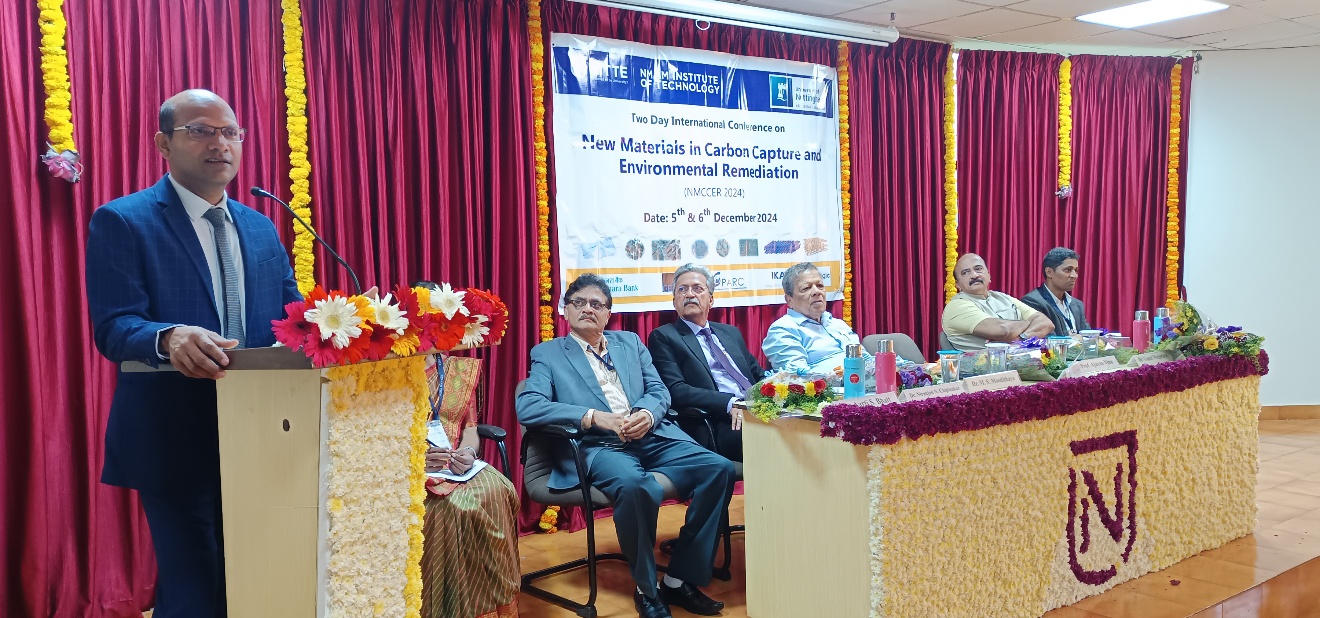
Afforestation activity:
Over the past year, more than thirty nature restoration activities have been undertaken. These included a series of plantation drives during the monsoon season, organized on occasions such as World Environment Day, resulting in the planting of over 150 saplings across various campuses. Additionally, as part of an academic initiative to promote environmental awareness and sustainable practices, 350 packets of seed balls and seed pens were distributed.
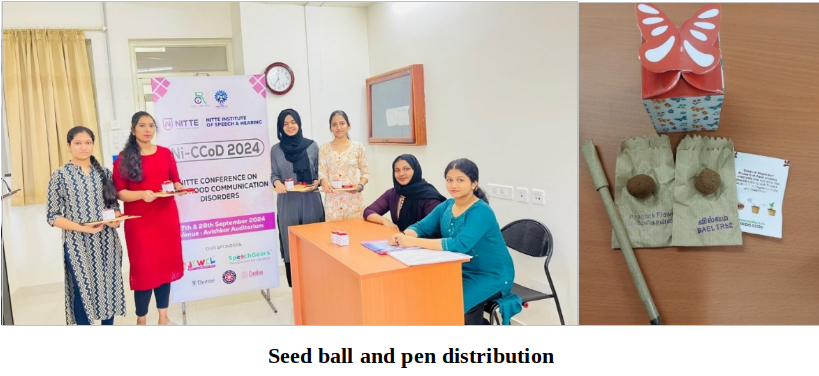
Seed ball and pen distribution
Lake Rejuvenation:
As part of the University’s commitment to sustainable development and environmental protection, NUCSER adopted the Someshwar Temple Lake in Ullal, Mangaluru, and organized a “Lake Rejuvenation” event on October 23, 2024. Faculty members and research scholars from NUCSER actively participated in the initiative, focusing on cleaning the lake and its surroundings. Their efforts included removing weed plants, clearing plastic waste from the lake, and collecting debris from the vicinity to ensure a cleaner and safer water body. Additionally, the team displayed placards with slogans advocating for water body conservation to raise public awareness. This initiative by NUCSER had a meaningful impact on improving the lake’s cleanliness, inspiring the community to maintain and protect aquatic ecosystems.
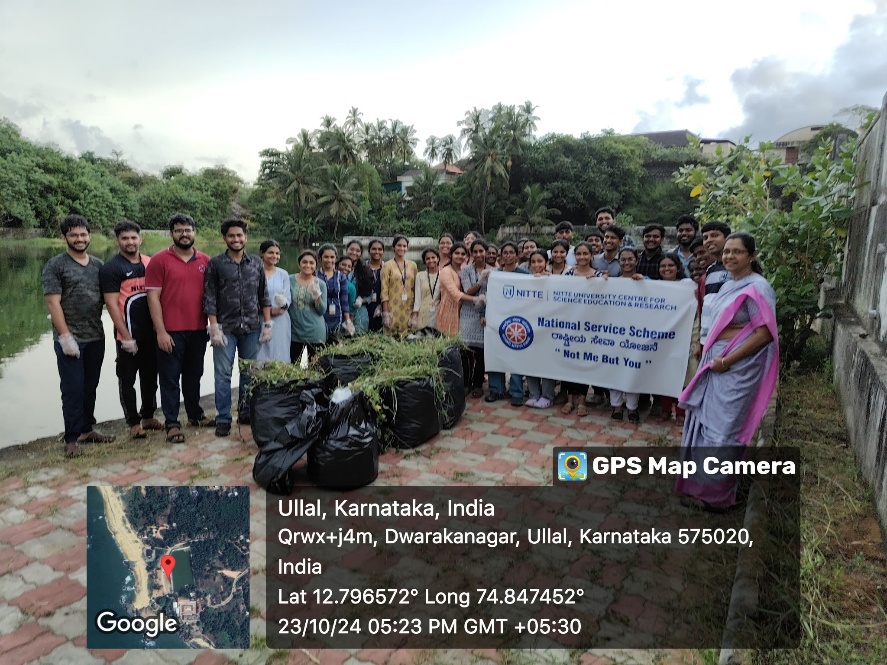
Lake Rejuvenation event
Waste to Wonder – Christmas Tree Making Challenge 2024
The "Waste to Wonder – Christmas Tree Making Challenge 2024" was a unique competition organized by the Nitte Institute of Architecture, aimed at promoting sustainability, creativity, and environmental awareness through upcycling practices. Participants were encouraged to create innovative Christmas trees using household or campus waste materials, transforming discarded items into meaningful artistic expressions. The event served as a platform for creative dialogue around environmental issues, showcasing how design thinking can inspire action for a more sustainable future.

Rejuvenation of water body for Kumpala Village
On 10th December 2024, a preliminary site visit to the water body at Kumpala village was conducted by representatives from the Rotary Club Mangalore, members of the local Rotary Community Corporation, and the Nitte Institute of Architecture. Led by Prof. Ar. Vinod Aranha, Director of the Nitte Institute of Architecture, along with Ar. Aveek Gosh and Ar. Anil Devadiga, the visit aimed to assess the current condition of the water body, its accessibility, and the surrounding areas. This assessment was part of a proposed rejuvenation and community engagement project.
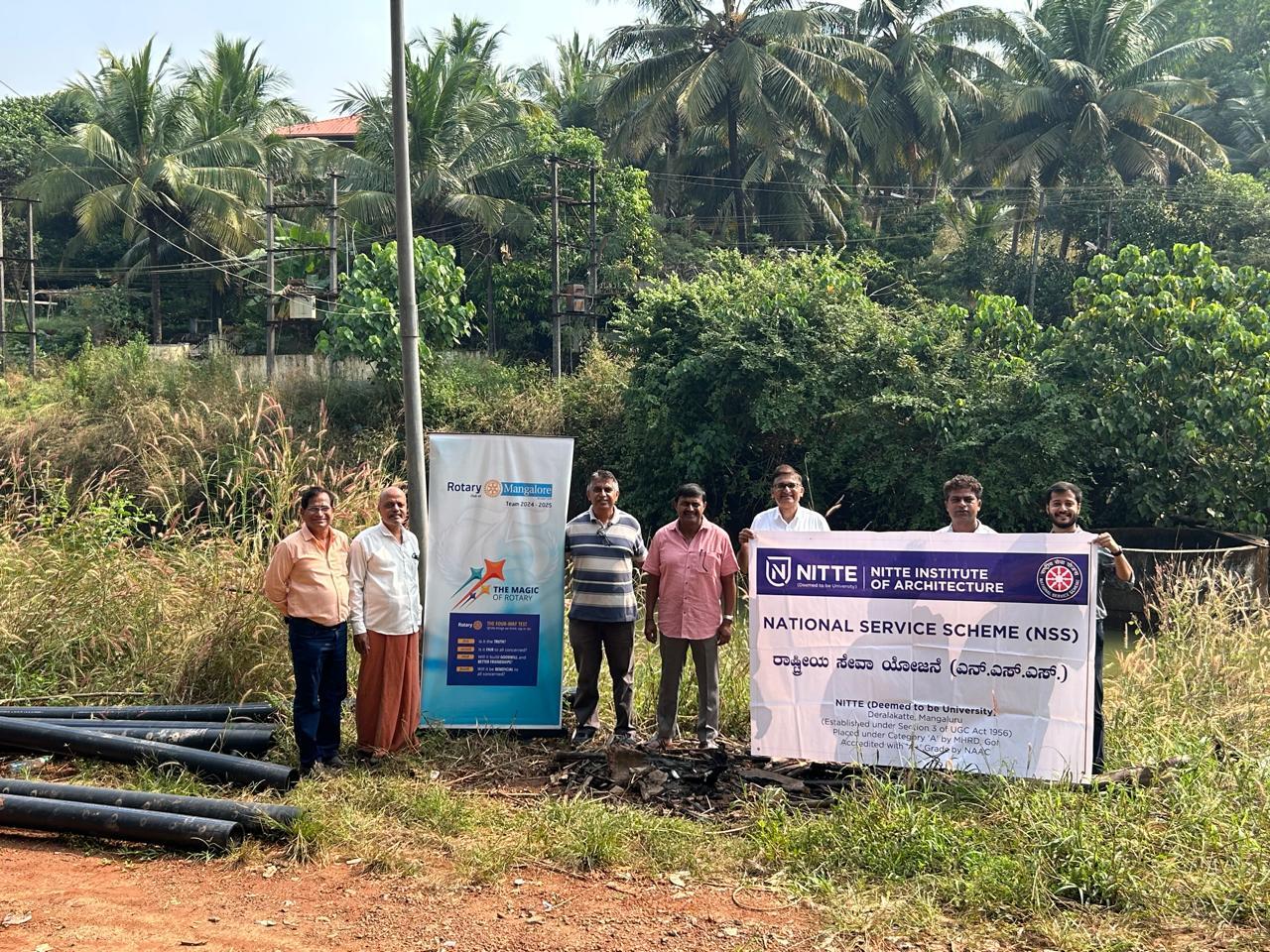
Community engagement program


.png)